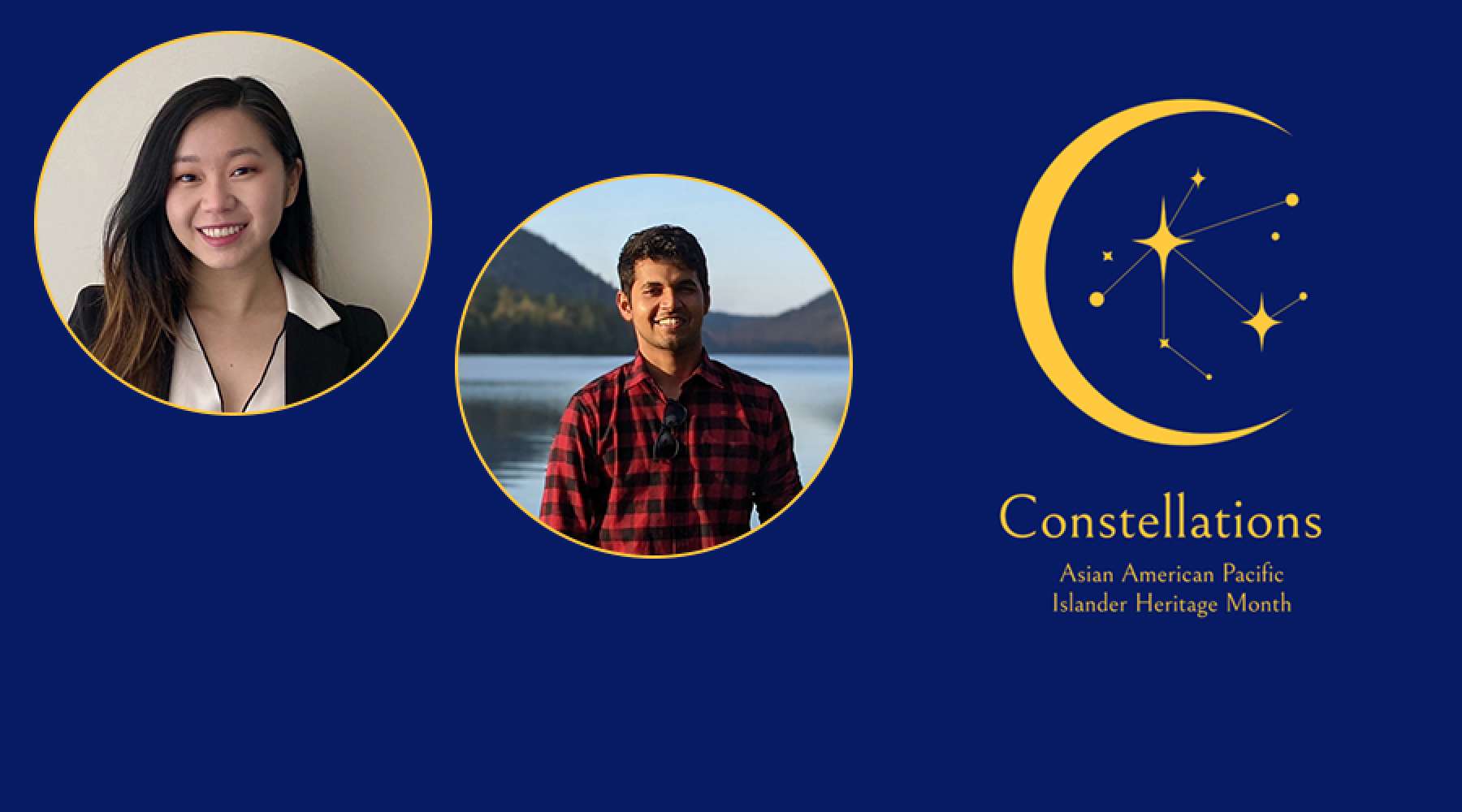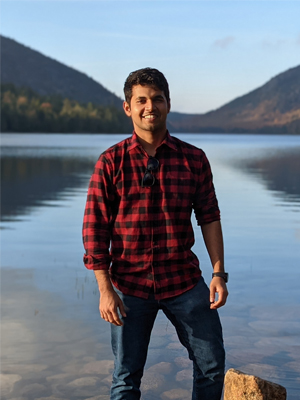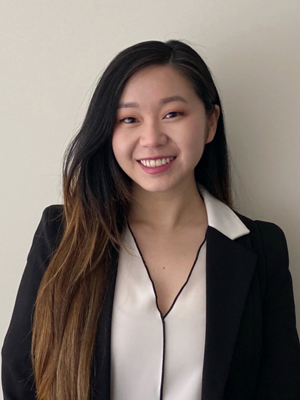
Throughout the month of May, the Tuck and Dartmouth communities will offer a number of events and programs to celebrate Asian American Pacific Islander Heritage Month. AAPIHM 2022’s theme, Constellations, explores the ways in which each member of the AAPI community creates connections with each other and with other marginalized communities. Each constellation represents the solidarities formed across time and space, symbolizing transnational and transcultural strength.
In celebration of AAPIHM, we asked members of our AAPI community to reflect on their goals, accomplishments, inspirations, and passions.

What’s something about you only a few people know?
I play the guitar, maintain copious travel journals, and try and summit one high-altitude peak every year—the highest I’ve gone is 15,000ft! COVID and then a serious knee injury have thrown a spanner into that part of my life recently, but I’ll be back soon!
How would you describe your life philosophy?
My philosophy is captured in three basic ideas: be kind, be brave, and do more.
I studied physics as an undergrad and the one big thing I took away from the study of the physical world was the staggering realization of just how large, old, and unfriendly the universe is, and how precious and unlikely our existence within it is. Our ability to experience life is a precious gift from probability and the best thing we can do with it is to experience it fully and to make sure that others around us experience it fully—something that being kind, being brave, and doing more enable.
What is your vision for the future? What do you believe will be the defining issue of the next 20 years?
I believe that we are at a unique point in human history—we have the conscience and awareness of the second and third-order impacts of human systems, and the technology, capital, and will to do something about it. Within this macro context, I think the defining issues of our time will be our relationship with our planet (climate change, waste management, wildlife conservation) and our relationship with one another (polarization, inequality, social media).
What have you recently, read, watched, or listened to that you enjoyed and would highly recommend to others?
Other Minds, by Peter Godfrey Smith, is a book that explores sentience and consciousness in octopuses from both a biological and a philosophical perspective. The TL;DR of the book is that the closest shared ancestors of humans and the octopus lived 600,000 years ago before life’s ascension onto land had even begun. The mammal brain and the octopus brain, therefore, evolved over thousands of years under wildly different environments. On land, humans evolved the most developed brain, but in the ocean, the octopus has the strongest claim to that title. In essence, evolution built the brain twice (one in the ocean and one on land), and therefore, studying the octopus brain is the closest we can come (so far) to studying what an alien brain may look like. Highly recommended for anyone interested in the natural world, the study of consciousness, or learning about something entirely new!
Kartik started his career with Deloitte Consulting where he helped clients in healthcare and life sciences identify M&A targets and improve top-line strategy. He then moved on to ReNew Power, India’s largest clean energy developer, where he helped his firm invest in emerging cleantech (green hydrogen, energy storage, etc.) and expand into new geographies. At Tuck, Kartik is the CFO of TuckStuff, a student-run retail business, the co-chair of the South Asian Business Association, and a PEVC fellow at the Center for Private Equity & Venture Capital. Kartik will be interning with L.E.K Consulting in Boston over the summer.

What keeps you busy? How do you like to spend your time outside of work?
One of the key things I learned from my experience at Tuck is JOMO and being very intentional about what I dedicate my time to. Every day at Tuck there are at least two to three conflicting events that I always want to attend. But like in the real world, time is a scarce resource, and it forces me to prioritize what I feel would add the most value. I’ve learned that it’s completely okay to slow down, be in my own little bubble and even derive ‘joy from missing out.’
Outside of school/work, you can find me involved in extracurriculars like working on the Next50 Initiative, trying to build investment memos at the Tuck Social Venture Fund and the early VC workshop, participating in case competitions, skiing, doing nature walks at Occom Pond, grabbing coffee at Nest and Lucky’s, or hiking at Gile.
Describe a challenge you encountered in your life and/or career, how you were able to overcome it, and what you learned.
At the beginning of my professional career, I struggled a lot with the lack of control I had in curating an accelerated and fast-paced professional development journey. Straight out of undergrad, I was hungry for knowledge, learning, and experience. The most impactful feedback I’ve ever gotten from my mentor was that “I can’t cheat experience.” I needed to develop my core foundational repertoire of skills and learn to walk before I can run. At the time, I was frustrated by the inability to be in the driver's seat of my career. But as I slowly gained more experience and matured, I realized the validity of the claim and the benefits of slowing down to speed up.
What does diversity, equity, and inclusion mean for you today, and in your words, why is it so critical?
DEI to me is more than representation, it’s a moral obligation. It’s a practice that at its core is to curate an environment that celebrates differences and ensures everyone—regardless of race, ethnicity, sexual orientation, or identity—is given the support to be on an even playing field. From this, we’ve naturally seen the downstream benefits of more informed decision-making due to diverse perspectives, solving niche problems that may not affect the majority, increasing productivity and general wellness, etc. when individuals can be themselves and are given the resources to excel.
In your opinion, what makes a good leader?
In my opinion, a good leader needs to embody three characteristics. They need to be versatile, empowering, and empathetic.
Prior to Tuck, Sherry worked in the healthcare industry with a focus on drug licensing, consulting, and executing market entrance strategies to reshape the perceptions of cannabis as a consumer retail product. She received her Bachelor of Health Sciences and a Master’s in Biomedical Discovery and Commercialization from McMaster University (Canada). Throughout her career journey, she has worked in male-dominated, non-diverse environments where proactively speaking out was not always met with positive reactions. Having lived through experiences like these, she wants to be involved in more DEI initiatives at Tuck to add representation and diversity to the Tuck curriculum. Outside of DEI, she is a Healthcare Fellow; TVSF Director; ASW, WIBC, and ABC co-chair; and loves making macarons, yoga, and dancing.
Many Voices, One Tuck celebrates the stories of our vibrant and diverse community. What’s your story? Email Community, Culture, and Engagement if you’d like to contribute to the MVOT project.
Note: MVOT is open to members of the Tuck community, including students, alumni, faculty, staff, TEE and Tuck Bridge participants, and MHCDS graduates.